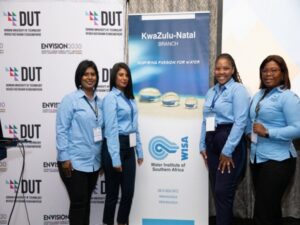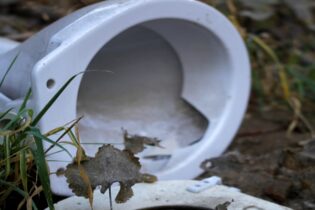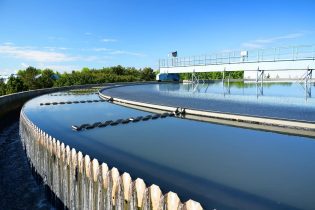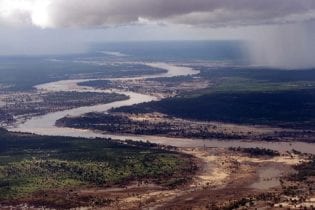The WISA KwaZulu Natal Branch in partnership with Durban University of Technology, Ewseta, Umngeni– UThukela Water, Universal Water Solutions, Borda SA, and the Department of Water and Sanitation recently held a symposium that brought together water, sanitation and hygiene (WASH) sector stakeholders and academia.
Dr Nomcebo Mthombeni, acting deputy dean, Durban University of Technology “Collaboration, innovation and education are the keys to a sustainable future in the water and sanitation sector.”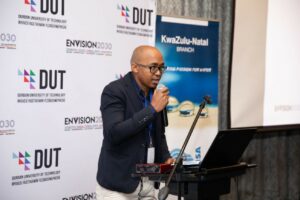 Mluleki Mnguni, WISA 2024 Conference Chair, highlighted the challenges that have plagued the WASH sector lately, with particular reference to cholera cases. “We should not be having reports of cholera outbreaks in South Africa in 2024, this is evidence of governance issues in the WASH sector.
Mluleki Mnguni, WISA 2024 Conference Chair, highlighted the challenges that have plagued the WASH sector lately, with particular reference to cholera cases. “We should not be having reports of cholera outbreaks in South Africa in 2024, this is evidence of governance issues in the WASH sector. 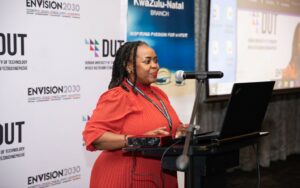 Nthabiseng Fundakubi, the deputy director general of the Department of Water and Sanitation
Nthabiseng Fundakubi, the deputy director general of the Department of Water and Sanitation Nthabiseng Fundakubi, the deputy director general of the Department of Water and Sanitation (DWS) stressed the importance of water sector collaborations from grassroots. She believes that it is essential to include children from primary school level on water awareness campaigns and advocacy. “Curricula at higher institutions must be fit for purpose so that graduates can easily fit into the workplace. Industry practitioners should not shy away from mentoring and supervising academic students from primary school level. They can also provide real time WASH projects for lecturers and students to get better industry exposure.”
Nontando Rambau, associate, Talbot and Vikesh Daya, MD Universal Water Solutions Rambau shared her personal experiences as a practitioner who started working in the private sector after graduation. “The private sector requires professionals with skills and do not make it a habit to recruit graduates who do not possess those specific skills. Graduates are not exposed to technological advancement and therefore lack this skill; they need to align with the 4th industrial revolution. Communication, project management, financial, and leadership skills should be honed at the academic level, particularly with postgraduates.” Day spoke about the need for the private sector to provide more opportunities for graduates without and experience or skills. He highlighted that this can only be done if private, public, academic, government sector work together and are intentional about developing a specific workforce for the sector. “Academia must develop soft skills at academic institutional level, so that graduates will manage with integrating into the private sector.” Outputs of the symposium:- The WASH sector is need of such sessions that bring all role players together, to discuss and implement sustainable solutions for the South African community. WISA has a role to play in bringing all stakeholders together and these sentiments were shared by most in the room.
- All academic Institutions present saw a need for industry professionals to play a role in the development of curricula that will suit the sector. Industry personnel were also encouraged to open their doors to provide mentorship and supervision to both graduates and lecturers either through formal programs such internships, the WIL program or informal mentorship and guidance.
- Professional bodies should have more engagements with academic institutions so that students are aware of them, and are able to focus on working in the sector.
- Industry to open their doors to provide industry experience to academia lecturers and professors so that they can meet the requirements of professionals bodies such as SACNSP and ECSA. This will assist in bridging the Academia-Industry Gap as lecturers will be aware of Industry needs.
- WASH sector practitioners need to utilise the professional bodies such as WISA in doing more meaningful school and community engagements so that community is aware of the water sector and the careers that are needed. School children to be guided from early stages so that they select the correct subjects which are aligned with workforce requirements for the sector.
- Durban University of Technology
- Umngeni- UThukela Water
- EWSETA
- BORDA SA
- Universal Water Solutions
- EThekwini Municipality
- University of Kwa-Zulu Natal- WASH R and D Center
- University of Johannesburg
- Rand Water
- MISA
- South Africa Youth Parliament for Water
- Mangosuthu University of Technology
- Talbot
- Elangeni Tvet College


